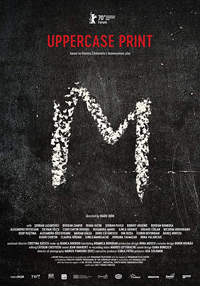Capital Crimes: The Play’s the Thing in Jude’s Rendering of Secret Police Files
 Romanian director Radu Jude lets no grass grow under his feet, back with two new projects in 2020. Fresh off winning the Crystal Globe at Karlovy Vary in 2018 for his exceptional I Do Not Care if We Go Down in History as Barbarians, Jude attempts another reenactment of ills generated by the might of Ceausescu’s Communist regime with Uppercase Print, another blending of written and visual formats documenting the investigation against a teenager in 1981 Botoșani based on a play by theater director Gianina Cărbunariu. Although avoiding the melodramatic pratfalls of historical reenactment, Jude’s latest underwhelms in its alienating propensity for stilted performances relegated to oft-monotonous line delivery in a package which would feel more forgiving with a shorter running time.
Romanian director Radu Jude lets no grass grow under his feet, back with two new projects in 2020. Fresh off winning the Crystal Globe at Karlovy Vary in 2018 for his exceptional I Do Not Care if We Go Down in History as Barbarians, Jude attempts another reenactment of ills generated by the might of Ceausescu’s Communist regime with Uppercase Print, another blending of written and visual formats documenting the investigation against a teenager in 1981 Botoșani based on a play by theater director Gianina Cărbunariu. Although avoiding the melodramatic pratfalls of historical reenactment, Jude’s latest underwhelms in its alienating propensity for stilted performances relegated to oft-monotonous line delivery in a package which would feel more forgiving with a shorter running time.
At the beginning of the final decade in Ceausescu’s tight grip on Communist Romania, the seeds of dissent were in full swing. An unlikely instigator of significant unrest with the Secret Police (Securitate) was sixteen-year-old Mugur Calinescu (Serban Lazarovici) who was apprehended for writing messages of protests in uppercase with chalk on various city walls. Thirty years later, access to these secret police files allows for an examination of Calinescu’s case, whose life was ruined by the state. Juxtaposing propaganda footage from National Television of the period with information gleaned from the files as well as an approximation of the personal lives affected by the investigation, including the student’s parents, friends, and various school officials, Jude remounts this instance from 1981 as a clinical study of passive protest crushed beneath the wheels of overzealous government powers.
Uppercase Print is a mishmash of actual television footage from the period, fragments which are pieces of such trenchant cultural propaganda it definitely plays like blatant brainwashing mechanism it was. In turn, he presents a filmed version of the play, so his characters freely break the fourth wall, delivering monologues about their experience, at times as if subjects in a documentary as they relay their material. The result eventually becomes an uneven one, with the raw footage trumping our interest in these characterization reenactments, which are often stilted, clinical and feel disconnected from the immediacy of the fear and trauma evoked by Ceausescu. As such, his latest feels a bit like hybrid of documentary and filmed play, and as Calinescu, the demeanor of Lazarovici is muted, a figure depicted as being caught in an impossible scenario wherein he’s obliged to downplay the significant, impassioned ideals which brought him to his acts of rebellion. What’s missing from this representation is the weight of the consequences he and his family faced in the dogged investigation.
In cinematic terms, Calinescu’s actions, scrawling messages demanding freedom and improvements in the country’s food supply, aren’t far off from those who spread underground pamphlets in Nazi Germany (think Alone in Berlin or Jojo Rabbit as some recent glossy depictions of printed resistance). And while Communist era Romania wasn’t Nazi Germany, the trepidation and dire consequences are comparable in how humans develop resiliency against such mechanisms. Instead, Uppercase Print is a bird’s eye, observational glance at a surveillance state which misses out on the solemn energy which would have been generated from watching the actors performing the material live on stage.
The immediacy and passion instilled by the depiction (and importance of) the historical reenactments which made up the successful finale of Barbarians evaporates into a more cold, austere presentation in Uppercase Print, which sometimes numbs instead of energizing.
Reviewed on February 22nd at the 2020 Berlin International Film Festival – Forum Sidebar – 128 Mins.
★★½/☆☆☆☆☆


